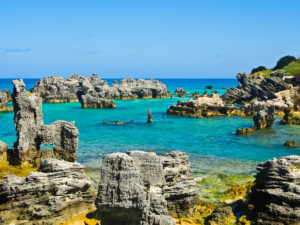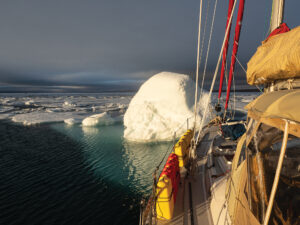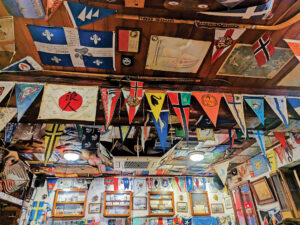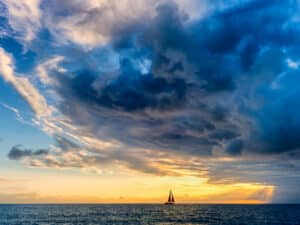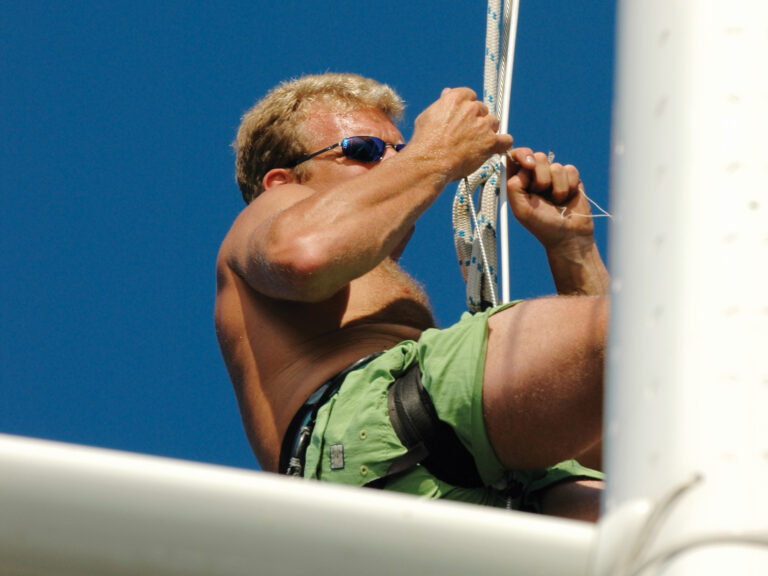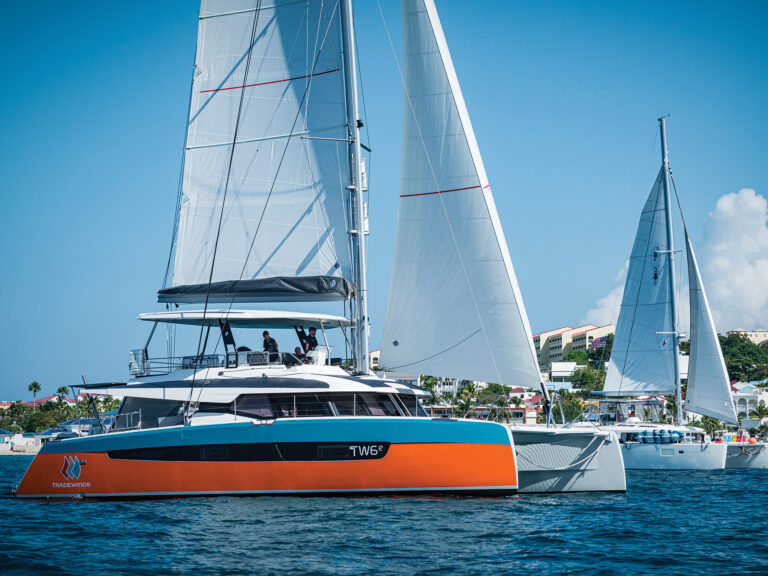Riding the bus from Spanish-language school in Antigua to Guatemala City, and then the second bus from Guate back to Ithaka on the Rio Dulce, took nine hours in total, instead of the usual six. The extra hours were due in large part to the Rio bus pulling over and letting pass a national bicycle race in which athletes with thigh muscles the size of redwoods pumped their way up volcanic mountains.
| | Douglas captures the sights, as we wait by the side of the road.* * *| Awed by tenacity and muscle, my reveries took me to the two pretty young women, one Czech and one Swede, whod chatted with me during a coffee-break one day at Spanish school. Theyd ooohed and aaahed about how I was “an inspiration” to them. Me? I sucked in my guteven though its hard to talk when you cant exhalebecause its not often young blonds notice Im alive. I had no way of knowing which among my many virtues and exploits was impressing them, so in my best Ricardo Montalban accent I said,_ “De nada,”_ its nothing. And my mind loped into fantasyland. I glanced over at Bernadette talking in another group, and hoped she was catching this. I thought I saw her eyes roll.
The Swede continued: “Usted es un magnifico para no ser joven.” I had to ask her to repeat herself, as my Spanish is slow, and I was still struggling to hold my breath. Did she really say that I was “magnificent for not being young”? (Sadly, yes.) “Usted me da esperanza,” she continued_. “Si un viejo lo puede hacer en escuela, todos es possible.”_ (You give me hope. If someone so old can catch on in school, anything is possible.)
There you have it, one quick crash from Hairy-Chested Heartthrob to poster boy for the Still-Ambulatory Middle-Aged. But I took some satisfaction in actually grasping whole sentences, even if I didnt like the sentiment and couldnt snap back with a face-saving reply. Europeans, I figure, have a built- in advantage in that their itty-bitty little countries are crowded so close together they can eavesdrop across borders while in utero, and come out of the womb chattering in a half dozen dialects. Being from Ohio, thats not an option for me; but in my plodding way, I stood up for all middle-aged American men and said in my best Spanish “That thing is easy to say for me. I am old, yes, but I am not more stupid than cows or have a small wiener.” I looked over to Bernadette, and her grin revealed that Id never hear the end of this.
| | Coffee beans on the vine in the northern Guatemalan city of Coban* * *| But that was last week and light years ago. With hurricane season drawing to a close, were now truly back aboard _Ithaka,_ and the realities of life no longer pivot on Spanish-English dictionaries, land-based travel, or European vixens. I was surprised how pleased I was to unpack our big knapsacks and stow them away in the forward cabin. While Ive always loved meandering, both of us were ready to return “home” to the boat, to our more structured existence and our familiar bed. Bernadette rejoices in putting all the stuff away that wed left out in “boat-storage mode,” in setting up the awnings, in reprovisioning, and in being able to make a cup of Earl Grey Tea just the way she likes it. As for me, Im just glad to let out my breath, take off my shoes, get my lists started, and slurp up Geritol with a twist.
At Tortugal marina were meeting up again with folks we havent seen in a while. Some of whom, like we were, have been abroad in their home countries, traveling around Central America, or studying at Spanish-language schools; and a few have been working on their boats in the swelter of a jungle summer, preparing for the earliest possible departure. There are four boats here (three French and one Belgian) that want to make a fast trip to the States, taking off next week and hoping to make brief stops at the atolls in Belize, then Isla Mujeres in Mexico, and up the north coast of Cuba, before heading to Key West. Their ambition is to be there before the winter northers start blowing. Theyre scurrying about at a speed that far exceeds the rest of ours. And they make me feel like Im already late for something, but I dont quite know what.
| | Coban coffee beans on the way to market* * *| For Bernadette and me, too, life is now more than just taking in the sights, hanging out in cafes, drinking Guatemalan highland coffees, and studying verb conjugations. Were readying _Ithaka_ and ourselves, figuring weve got a good three weeks of boat projects before its the right time to leave the protection of this marina. I know we wont get all our jobs done, especially because other items will be added, but here are some highlights from the list.
We need to equalize the batteries, which means boiling the daylights out of them for enough hours to shake off any sulfates that have adhered to the lead plates. Weve got to take off the dead radar unit, snake in new power and data cables, and mount both the screen and the radome. This sounds clean and simple, but no task is completed in a linear fashion, and I know this will end up taking a week. There will be interruptions for thunderstorms, blocked wire passages, misaligned holes, absent parts, and heavens knows what else. There are no Boat US stores in the jungle, so scrounging parts and making do is a big part of the game.
| | Bernadette, with a rake used to spread the loose coffee beans as they slowly dry in the hot Guatemalan sunshine* * *| We need to check the rigging, a two-part task performed with highly sophisticated marine instruments. First well use a childs magnifying class to examine all the fittings to check for cracks, and after that well rub a nylon stocking over the shrouds to make sure there are no stainless steel split ends. If there are no problems (right!) this should only take two people two full daysunless, of course, it rains, which its still doing almost every day. The tricky part is swinging out in the bosuns chair at 50 feet and stroking the shrouds. The same days well check all the masthead fittings, clean any corrosion off the connections for all exterior lights and antennas, and say prayers upon my slow and safe arrival on deck. With me in the chair and Bernadette raising and lowering me, Im usually reminded of everything Ive done to offend her.
Theres not too much engine work. Well give the Yanmar a good cleaning, replace one hose, and swap out the old water pump impeller for a new one. Because theyre both hard to reach, I figure a full day for that too. Well also do our full boat hose-clamp check. Figure on most of a day there as well.
| | We traveled to Coban over the weekend, to get a break from school, practice our Spanish, and catch the national folkloric festival.* * *| For reasons that so far escape me, when we returned to _Ithaka_, the windlass worked fine for bringing up chain, but it no longer doles it out on demand. I havent gotten out my multimeter yet nor unscrewed the deck plate over the switch, so I dont know if the problem is in the switch or the solenoid. Im hoping for the former, because we have a spare on board. If its the solenoid, well I dont even want to think about that yet. Down here, that will present one more undesired challenge.
I also need to remove our alternator and install an identical one. This is a never-ending saga. Our boat has two alternators, a small one dedicated to the battery we use to start the engine and a large high-output alternator, that we use for charging up all the batteries for the rest of the boat. Last spring the big guy died, but we had a spare on board and my friend Frank, on Simba, helped me install it. However, the new alternator, when pumping high amperage, also emits a high-frequency and inaudible radio wave that miraculously and exactly matches the depth sounder and completely blots out its ability to read water depth. This is not good.
| | Every town in Guatemala has a different day of the year on which they celebrate their history. During these fiestas, folkloric dancers entertain the crowds in the towns main squares.* * *| Especially in shallow water, we like to know approximately how long it will be before we hit something ugly and grind to a halt. But, it isnt the end of the world either, because the way _Ithaka_ is set up, we can throw a switch that turns off the alternator when we get closer to shore and need to know the depth. Call me romantic, but I think it would be terrific if those two would put aside their differences and work together. For you techies out there, weve checked everything we could think of, and weve consulted the various tech-weenie Gods while we were back in Rhode Island. There are no wires closely paralleling each other where there could be a crossover bleed. The connections are clean everywhere, and I installed a noise filter on the intake side of the depth-sounder display and the output side of the alternator, all to no avail. In the States, I spoke to the folks who made our alternator, and they said this is the first time one of their products has had this problem in many years (now theres a surprise), and they suggested we put in an identical alternator (we carry a spare) to see if theres some idiosyncratic anomaly for that particular unit. Thats my next step, and I figure on a good two days for this one. If I really knew what I was doing, I could get it all done in one, but thats unlikely. (After all the drama with the depth-sounder, my Personal Commodore has insisted that we install a second unit when we next haul the boat. This is an example of her optimism; she assumes the problem will never be replicated with a different brand. Umm…)
| | Guatemala is full of fruits we’ve never seen before, with names we misprounounce. But that doesn’t stop us from eating lots of them. This one, a patella, tastes like the love child of a pear and a raspberry.* * *|
We also need to reprovision, check and grease all the seacocks, go over the running rigging, check all the antenna connections, clean the bottom, check all the electronic instruments to be sure none of them are on strike, AND figure out exactly where we’re going next. For an inspiring old guy like me, that’s a return to reality, and it’s good to be home. As for my fellow students, I finally remembered a Spanish proverb from last week. “Al cabo de cien años, todos seremos calvos.” Loosely translated that means: At the end of a hundred years, baby, we’re all gonna be bald.

